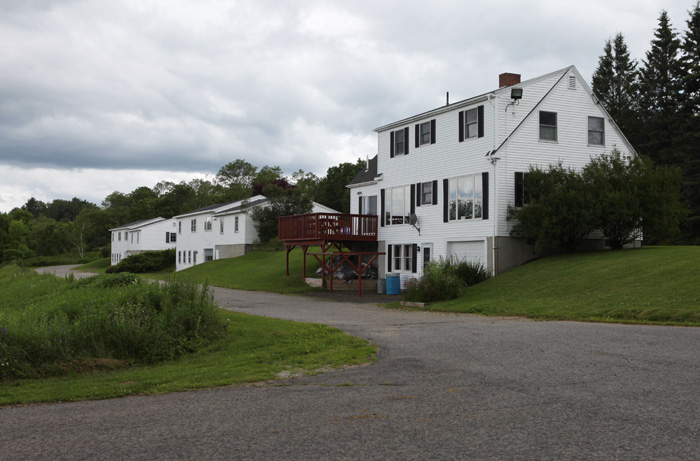AUGUSTA — Maine State Prison Warden Patricia Barnhart told lawmakers Tuesday that she thought her purchase of state property in June had been scrutinized by state officials who considered legal and ethical issues before signing off on the deal.
The sale of five acres and three houses in Thomaston for $175,000 has since been declared void. Attorney General William Schneider found last month that it violated a law that prohibits state employees from having a financial interest in state contracts.
While Barnhart told lawmakers that she’s trying to work with the Attorney General’s Office to negate the deal, members of the Government Oversight Committee wanted to know how several high-level state officials could have allowed the sale.
Committee members also asked why the sale price was so low, and why the real estate broker, CBRE/The Boulos Co., never marketed the property so other potential buyers could bid.
A key line of questioning focused on why no one questioned whether it was ethical to sell state property to a state employee.
An email sent in September 2010 from Denise Lord, who was the associate corrections commissioner, to Chip Gavin, who was director of the Bureau of General Services, indicates that Lord wanted to know whether there were “any prohibitions or concerns” about Barnhart’s interest in buying the property.
Gavin did not reply to the email, but called Lord to tell her that Barnhart should contact the real estate broker directly if she had interest in buying the property, Lord said.
Barnhart has lived in one of the three houses on the property on Ship Street Circle since the state hired her from Michigan in 2009 to run the state prison in nearby Warren.
Barnhart told lawmakers that no one from the state raised questions about whether, as a state employee, she should be allowed to buy state property.
“Clearly, months had transpired, so if there were any questions, several months had been allotted for folks to make those inquiries,” she said. “If the answers were unfavorable, we would not have pursued the purchase.”
Later, she said she was “putting her trust in the wrong bucket.”
The property was sold to Barnhart – who represented herself in the sale and did not hire a real estate broker – and her stepson, Sheehan Gallagher.
Barnhart was just one of the parties in the transaction who answered lawmakers’ questions Tuesday.
Gavin spent more than 90 minutes answering questions. He said the state officials who were involved in the sale were trying to comply with a legislative mandate to fill a budget shortfall by selling $1.5 million worth of state properties.
“I regret that those with the benefit of hindsight believe something other than that was occurring,” he said.
When asked about Lord’s email, Gavin said he didn’t think it was unusual for the warden to want to buy the property.
“It’s not unique that an occupant of a property can be among the most motivated buyers,” he said.
Roger Katz, R-Augusta, the committee’s Senate chairman, said state law is clear that properties cannot be sold to state employees. “Were you aware of the statute?” Katz asked.
“I don’t recall specifically,” Gavin responded.
Through four hours of questioning, current and former state officials described the situation in which there was a mandate from lawmakers to sell property to fill the hole in the budget.
The Thomaston property was one of several chosen to be sold, but the state wanted to retain the right to use one of the three houses – known as the bunk house – for Department of Corrections workers who needed a place to stay more than 100 nights a year.
That condition made the property much less desirable to potential buyers, driving down the price it could command, especially in a down real estate market, said Chris Paszyc, the Boulos broker who handled the sale.
The property has been valued differently in recent years. The town of Thomaston set a taxable value of $512,263. Paszyc said he valued the property at $220,471 to $249,978. He said real estate brokers do not use tax values when calculating how much money a property can bring in a sale.
He advised the state to start with a $300,000 asking price, knowing it would sell for less.
He said the bunk house also caused confusion about how to market the property, and despite a contract that required Boulos to advertise the property for sale, the company never did. It also declined to negotiate with a potential second buyer who called in January, telling him that the sale to the warden was too far along to accept other bids.
Throughout Tuesday’s meeting, lawmakers expressed dismay that no one raised red flags as the deal progressed.
Part of the contract with Barnhart required the state to provide snowplowing, landscaping and trash removal at all three houses. The state agreed to pay Barnhart $1 a year to lease the bunk house.
Barnhart said the maintenance was included in the deal because she was going to be responsible for paying the property taxes. Since the state would pay only $1 a year to lease the bunk house, she felt it was appropriate to accept in-kind services.
While questioning Paszyc, Katz wanted to know if the broker had concerns about the public perception of selling a state property to a state employee.
“No one else in the free world apparently knew that this property was for sale,” Katz said. “It ended up getting sold to the warden for a price far below appraised value, assessed value, which may be completely appropriate. Did it cause you any concern that if this got out into the public it might not look right?”
Paszyc said he assumed the state would address those issues.
“So it didn’t concern you?” Katz said.
“No it did not, because it didn’t concern the state,” Paszyc said.
In the coming months, the state will get information about other property sales over the last five years from its Office of Program Evaluation and Government Accountability. Lawmakers will then discuss whether lessons learned from the Thomaston sale call for additional legislation.
Betty Lamoreau, who now heads the Bureau of General Services, assured the committee that a similar situation will not happen in the future. In addition to setting new procedures, she said, the current administration will likely make a future sale less complicated because it does not want to keep the bunk house.
“For the fact that I didn’t recognize it, I’m sorry, I wish I had,” she said. “I don’t think it’s the tip of an iceberg. Good people, doing the very best they could, trying really hard to meet a mandate, happened to have missed something we all wish we hadn’t missed.”
MaineToday Media State House Writer Susan Cover can be contacted at 620-7015 or at: scover@mainetoday.com
Send questions/comments to the editors.



